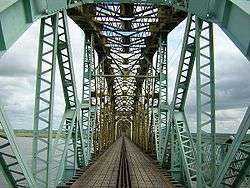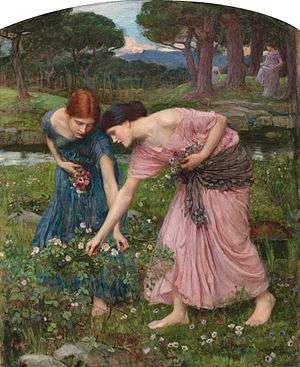Brodie Henderson (engineer)
Sir Brodie Haldane Henderson, KCMG, CB (6 March 1869 – 28 September 1936) was a British civil engineer.[1] Henderson was primarily a railway engineer who worked for many railroad corporations across South America, Australasia and Africa. He was the consultant for the Dona Ana Bridge which, when it was built in 1935, was the longest railway bridge in the world with a length of 2.24 miles. He volunteered for service with the Royal Engineers at the outbreak of the First World War and was put in charge of railway lines used to tranposrt Allied troops and supplies. In this capacity he held the rank of a Brigadier-General of the British Army and his success in this role resulted in him being decorated by the British, French and Belgian governments.
Brodie Henderson | |
|---|---|
| Born | 6 March 1869 Ealing, Middlesex |
| Died | 28 September 1936 (aged 67) Braughing, Hertfordshire |
| Nationality | British |
| Occupation | Engineer |
| Engineering career | |
| Discipline | civil engineer |
| Institutions | Institution of Civil Engineers (president) |
| Practice name | Livesey, Son and Henderson |
| Projects | Dona Ana Bridge, Transandine Railway |
| Awards | Knight Commander of the Order of Saint Michael and Saint George, Companion of the Order of the Bath |
After the war Henderson worked with the Imperial War Graves Commission, as High Sheriff of Hertfordshire in 1924 and as president of the Institution of Civil Engineers. He was an important patron of John William Waterhouse, the pre-Raphaelite painter, and was the original owner of Gather Ye Rosebuds While Ye May.
Early life and career
Henderson was born on 6 March 1869 in Ealing, Middlesex to George and Eliza Henderson, his elder brother was Alexander Henderson the businessman and politician.[1][2] His education was carried out in Germany, at Owens College in Manchester (now Victoria University) and at King's College London.[2] At the age of 16 he entered into a pupillage with locomotive manufacturers Beyer, Peacock and Company before transferring to James Livesey and Son, consulting civil engineers.[1][2] Some of his early projects was as assistant engineer during construction of the Algeciras Gibraltar Railway and a secondment in the civil engineer's department of the Lancashire and Yorkshire Railway.[2]

Henderson became a partner in the firm on 6 October 1891 and it was subsequently named Livesey, Son and Henderson.[2] He was named as senior partner in 1893.[1] Henderson's work was largely concerned with railways, which were often financed by his brother Alexander. These included the Buenos Aires Great Southern, Central Argentine, Antofagasta and the Midland of Western Australia railways.[1] Henderson was also responsible for the construction of new docks in Buenos Aires and projects in Spain, China and Africa.[1][2]
Henderson's most famous project is the Dona Ana Bridge over the Zambezi River in Mozambique for the Beira Railroad Corporation, this bridge was built in 1935 and spanned a distance of 2.24 miles by 33 separate arches. This bridge was the longest railway bridge in the world for many years.[1] He was also responsible for the Transandine Railway which was tunnelled through the Andes Mountains between 1911 and 1925.[2]
Military service
Henderson volunteered for a commission in the Hertfordshire Yeomanry after the outbreak of the First World War and was commissioned as a temporary lieutenant on 12 October 1914.[3] He subsequently transferred to the Royal Engineers and was made the deputy director-general of transportation in Belgium and France, being chiefly concerned with railway transport[1] He was commissioned as a temporary lieutenant-colonel and was subsequently promoted to temporary brigadier-general.[4] During his war service he was mentioned in dispatches on four occasions.[1]
In recognition of his war work Henderson was appointed a companion of the Order of St Michael and St George in the New Years Honours of 1918.[4] He was appointed a commander of the Belgian Order of the Crown on 11 March 1918.[5] He was appointed a companion of the Order of St Michael and St George in the New Years Honours of 1919,[6] an officer in the French Légion d'honneur on 7 June 1919[7] and a knight commander of the Order of St Michael and St George in the King's Birthday Honours of 1919.[8]
Post-war work
After the war Henderson worked as an honorary consulting engineer to the Imperial War Graves Commission.[2] He was also sheriff of Hertfordshire in 1922 and 1924 and High Sheriff of Hertfordshire between in 1925.[9][10][11][12] Henderson was appointed deputy lieutenant of Hertfordshire on 3 December 1926.[13] Henderson was also a justice of the peace, a governor of the Imperial College of Science and Technology and a member of the delegacy of the City and Guilds College.[2]
Henderson had a long association with the Institution of Civil Engineers, being elected an associate member in 1894 and a full member in 1899.[2] He was a member of its council from 1915, vice-president in 1925 and was elected president for the 1928-9 session.[2][14]
Personal life

Henderson became, through his brother Alexander, a patron of John William Waterhouse and owned several of his paintings.[15][16] He was the original owner of Gather Ye Rosebuds While Ye May, a 1909 painting by Waterhouse that was recently valued at CAD$4.8 million to $7.3 million.[17]
He married Ella Jones in 1901 and fathered a daughter, Joan, and three sons, Gerald, Neil and Andrew. Neil and Andrew followed their father as partners in Livesey and Henderson, as did one of Alexander's sons Philip.[1] Andrew Henderson and Harry Livesey left the partnership on 31 March 1932.[18]
By 1925 Henderson was living at Epping House in Little Berkhamstead.[11] Brodie died at Upp Hall, Braughing on 28 September 1936 of lung cancer.[2][1] He was cremated at Golders Green before being interred in the family grave at Braughing. A memorial service was held at St Michael's Church in the City of London.[1]
References
- Dictionary of National Biography entry
- "Obituary. Sir Brodie Haldane Henderson, KCMG, CB, 1869-1936". Journal of the Institution of Civil Engineers. 5 (4): 239–240. 1 February 1937. doi:10.1680/ijoti.1937.14776.
- "No. 28957". The London Gazette. 30 October 1914. p. 8768.
- "No. 13186". The Edinburgh Gazette. 2 January 1918. p. 9.
- "No. 30568". The London Gazette (Supplement). 8 March 1918. p. 3094.
- "No. 13375". The Edinburgh Gazette. 2 January 1919. p. 2.
- "No. 31393". The London Gazette. 6 June 1919. p. 7397.
- "No. 31395". The London Gazette (Supplement). 6 June 1919. p. 7420.
- "No. 32518". The London Gazette. 15 November 1921. p. 9028.
- "No. 32880". The London Gazette. 16 November 1923. p. 7849.
- "No. 32920". The London Gazette. 21 March 1924. p. 2415.
- List of High Sheriffs Archived 9 September 2008 at the Wayback Machine
- "No. 33227". The London Gazette. 7 December 1926. p. 8003.
- Watson, Garth (1988), The Civils, London: Thomas Telford Ltd, p. 252, ISBN 0-7277-0392-7
- "Waterhouse patronage". Archived from the original on 4 December 2008. Retrieved 16 February 2008.
- "Sir Brodie Haldane Henderson". Royal Academy of Arts. Retrieved 26 January 2018.
- CBC news report on painting
- "No. 33814". The London Gazette. 5 April 1932. p. 2244.
| Professional and academic associations | ||
|---|---|---|
| Preceded by Ernest Crosbie Trench |
President of the Institution of Civil Engineers November 1928 – November 1929 |
Succeeded by William Grierson |